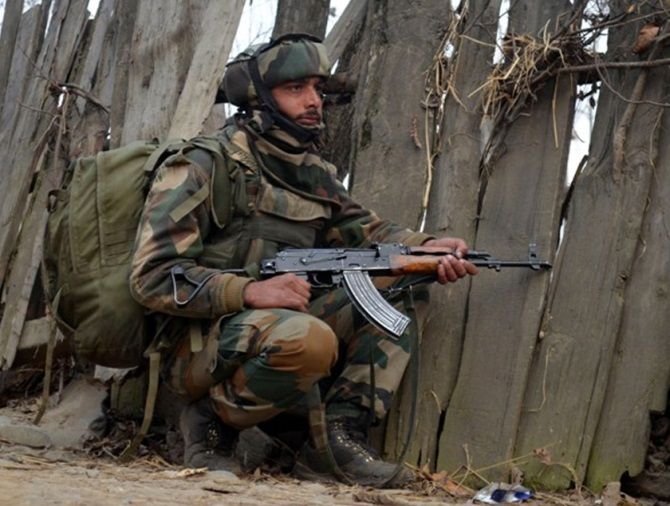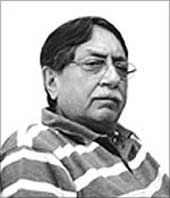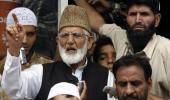 'I have never seen the Kashmiris in a more conciliatory mood or a more defensive and reasonable mood than I did when I went there in May. All of them said, "raasta nikaliye."'
'I have never seen the Kashmiris in a more conciliatory mood or a more defensive and reasonable mood than I did when I went there in May. All of them said, "raasta nikaliye."'
'Farooq Abdullah has said hundreds of times that the LoC has to be recognised as the international boundary. So that is where the solution lies, it lies on the LoC.'
'Infiltration is not the important thing. For me the more important thing is what you're asking, "Pakistan ki niyat kya hai?"'
A S Dulat has spoken many times with Rediff.com on the Jammu and Kashmir issue. He knows Kashmir better than any of his contemporaries. Dulat, retired chief of the Research and Analysis Wing, India's external intelligence agency, was then prime minister Atal Bihari Vajpayee's advisor on Kashmir.
He is perplexed by the Narendra Modi government's stance to call off foreign secretary-level talks and then the Bharatiya Janata Party's Mission 44 plan to win power in the J&K assembly election.
In his lucid manner, as always, Dulat, below, left, speaks his mind to Sheela Bhatt/Rediff.com and it is something India's policy makers must listen to.
The first of a two-part interview.
India cancelled foreign secretary-level talks citing the Hurriyat Conference leaders's meeting with the Pakistan high commissioner. How do you see the Indian action?
I was a bit surprised with what the reaction has been. Some people are trying to tell Pakistan, well, either you can talk to the Hurriyat or you can talk to us. Fair enough. I mean if this is how the government sees it and this is what the spokespeople of the BJP have been projecting it. They claim that this is a different BJP, it is a different leader and he is a decisive leader.
I think this point could have been made to Nawaz Sharif when he came here at their very first meeting. After the two prime ministers met it was reported that they had a very good meeting and the body language was good. And they had been talking about each other's mothers and shawls and all that. So, there was a certain bon homie. So why was he not politely told that we would love to move forward?
As we told them about terrorism, he could also have been told about the Hurriyat. Because I know that before Sharif came here, at that time this matter was also politely raised that we hope he is not going to meet the Hurriyat leaders. If he is coming here to meet the Hurriyat leaders it won't be nice.
So he obliged the Government of India. And for which he got a lot of flak back home, I think he must have been hauled up by the army. Still Sharif did what we expected of him. So I think the least that he would have expected of us, I think the least we should have done is to have politely told him thank you very much.
How do we know that it was not done? Some sources hinted that Sharif was told...
If he had been politely told that I think we can discuss any subject including Kashmir, but it is better if we keep the Kashmiris out of it, if he had been conveyed that message, I don't think this incident would have happened.
I am telling you why. Because what happened took everybody by surprise, including our ministry of external affairs. The Pakistan high commissioner was given 15, 20 minutes notice, that it is either us or the Hurriyat. If you tell a high commissioner, what will he do? He can at best make a call to Islamabad and ask what his option was. I think he was probably already late for his meeting with (Hurriyat leader) Shabir Shah.
I feel that it is not a distinct meeting. It has not been an issue over the last 20 years. It goes back not to Vajpayee's time, but to P V Narasimha Rao's time, that is when the first opening (when the Hurriyat leaders met Pakistani diplomats) took place. Why should we object?
Let anybody come, let anybody go. Let them go to Pakistan if they like. We have facilitated it. Vajpayee facilitated their travel. They were given travel documents to go to Pakistan, so what are we saying?
And when I say this, when I raise this issue with the current government, then the answer I get is, that is history. So Vajpayee is obviously history. And that is fine. If this is a new BJP, it's fine. But in the context of what you are saying, I think in all fairness if anybody suggests that Nawazsahab had been warned or sounded, then I don't know why they did this. Why would they want to do this? I don't understand it.
Pakistanis can very well say that for them Kashmir is an issue and they have been maintaining a certain contact. In any case I have another point in this. What are we trying to achieve by this? What happens in such cases is that a harmless cup of tea with these chaps is just a cup of tea, like (Jammu and Kashmir Chief Minister) Omar Abdullah says.
Once you put stop to anything, it only goes underground. It becomes clandestine. So is that what we want to encourage? Because that is what used to happen earlier. Before Rao opened it up anybody going to the Pakistan high commission and coming out was frisked. You know, security guys asked them 'Kya laaye ho?' And people got caught with money, also!
And Rao said I think we should stop this. Let them come and go. So if that is the idea that you want this whole thing to go underground, then maybe Kashmiris will find other ways of going because most of these Hurriyat leaders are now short of travel documents also. I think most of their passports are not valid.
So, if there is desperation then they may find other routes or rather ways of making contact. And also there is another thing. Quite unnecessarily, we will attract international attention to this matter which is totally over-settled, I feel.
It is not settled in the Kashmiri mind, Kashmiris still think there is an issue, but they are willing to sit and talk. I have never seen the Kashmiris in a more conciliatory mood or a more defensive and reasonable mood than I did when I went there in May.
All of them that I met said, 'Raasta nikaliye (please find a solution).' And they had very high hopes of the new government. It is a disappointing thing for the Kashmiris, they had such high expectations of this government.
(Hurriyat leader) Mirwaiz Omar Farooq went out of his way to congratulate Narendra Modi. So I don't understand the whole this thing of cancellation of foreign secretary-level talks. But if that is the decision of the government, then that will be the future...
 The Line of Control is again volatile. Lot of violations of the ceasefire are taking place. There are deaths of Indian soldiers and there are deaths of infiltrators also from the Pakistani side.
The Line of Control is again volatile. Lot of violations of the ceasefire are taking place. There are deaths of Indian soldiers and there are deaths of infiltrators also from the Pakistani side.
How do you see this increasing activity at the border? How do you see the bigger Pakistan game-plan on the issue?
See this LoC thing, we hype it up a great deal. It has happened from time to time. A lot goes on at the LoC which nobody knows. The realities that nobody knows unless you are there, unless you are in Jammu and Kashmir, you will never know what actually happens on the LoC.
There is always our story and their story. And these stories will never match. When you talk of infiltration, the figures of the army, the paramilitary forces, the J&K police and the Intelligence Bureau never match. So let us not only talk about that.
The question is that if there has been more killing on the LoC, which happens from time to time, it only means that both sides are more geared up for action.
You shoot, we'll shoot. We'll shoot, you shoot. That happens. So there will be more killings. Then it calms down. Because at the end of it, the question comes -- why are you killing each other? It is a pointless exercise. But yeah, it does get heightened from time to time.
There is some provocation, it is very difficult to say which side the provocation comes from. Each side blames the other.
What is the bigger game-plan?
The bigger plan is like this. Whenever we talk of infiltration, somebody who has watched this thing for 25 years, I don't pay too much attention to it or I don't worry too much about this. Because, this coming and going through borders keeps happening. For me -- and I used to say this even in 2001-2002 when the Americans and Westerners came and asked 'Is the infiltration up and is the infiltration down?' -- we used to say that it is sometimes up and sometimes down.
But I said that that is not the important thing. For me, the more important thing is what you are asking, Pakistan ki niyat kya hai (What is Pakistan's intention)? What is the Pakistani design?
Now my impression is -- please correct me if I am wrong -- that every Pakistani politician, in the last few years, from Asif Ali Zardari to Nawaz Sharif to Imran Khan, nobody has uttered a single word which we could call provocative. They have been very conciliatory on Kashmir.
Pakistan, I think, understands, like the Kashmiris, that the game is up in Kashmir. There is now, apart from just killing innocent people, there is nothing to be gained. But Pakistan wants to maintain this at a certain level. So that if the need arises, you can always create an incident. They have that capability. Whether they infiltrate or not.
Even if they don't infiltrate, there will be boys in the valley who will do it for them. Whether they are from Sopore or Tral, or Shopian, there are these bad pockets. There are boys available there who will do something if required.
But as the larger game-plan, I think that Pakistan would like to wash its hands of Kashmir. They are not gaining anything and they would like to find a via media.
Pervez Musharraf went quite far on this, as far as any Pakistani leader had gone, that four-point formula. Now we might not agree to the formula, Pakistan also may not agree to it, but the formula is not a bad formula in the sense that it is just making borders irrelevant, facilitating Kashmiris going and coming and making interaction easier. It is not a big deal.
The ultimate solution, if you ask me, is what Farooq Abdullah has always maintained. Let me say here that it is a pity that we have under-rated him. There has been no more nationalist leader in Kashmir than Farooq Abdullah. He has said hundreds of times that the LoC has to be recognised as the international boundary. So that is where the solution lies, it lies on the LoC.
Main Image: A soldier during an encounter with terrorists in Jammu and Kashmir. Photograph: Umar Ganie/Rediff.com
Part 2 of the Interview: 'The ISI doesn't care for Kashmir'

.jpg)









 © 2025
© 2025